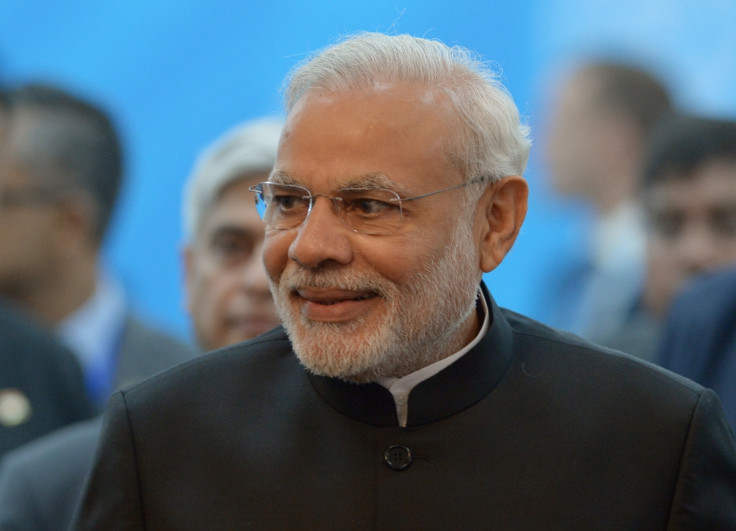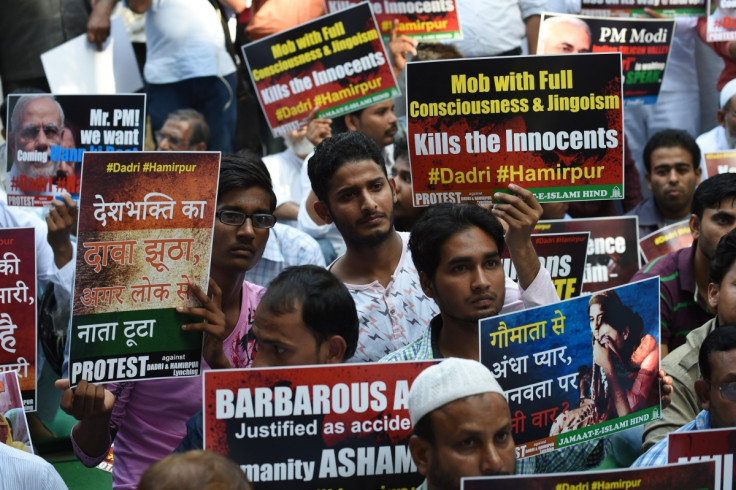Modi UK visit: Indian community protests against Indian Prime Minister's London trip

Sikhs, Muslims, Christians and members of the Dalit community have come together in a campaign against Narendra Modi's visit to the UK. The Indian prime minister is scheduled to visit the UK between 12 to 14 November and will be addressing the UK's Indian diaspora at Wembley Stadium on 13 November. The group is planning mass demonstrations to protest against what it believes is discrimination from Modi and his party against India's minority groups.
Until 2012, the prime minister was not allowed to enter the UK due to his alleged involvement in the massacre of Muslims in the Indian state of Gujarat. Modi was accused of failing to stop anti-Muslim rioting in 2002, which happened while he was chief minister of the state, and led to the deaths of at least 1,000 people. The US and other European nations also placed a travel ban on the controversial leader.
A protest has been planned outside 10 Downing Street on 12 November. It has been organised by campaign group Awaaz Network and is made up of a number of religious and campaign groups across the country, all of whom are calling upon people not to "buy the stage-managed, internationally orchestrated hype about Modi". It has also asked people in the UK not to attend the cultural show that will accompany Modi's speech at Wembley.
Kashmiri youth leader Fahim Kiani confirmed more than 200 mosques and Muslim organisations had held meetings on Modi's visit to the UK. Kiani told the News: "Thousands of demonstrators will come to London from all over the UK to show the Indian government how widely hated Indian chauvinist government is. Its leader Narendra Modi is a racist and mass murderer. He should be behind the bars for this crimes against innocent people."
Sikhs in the UK have backed concerns of Muslim groups, holding Modi responsible for the "massacre of at least 2,000 Muslims" during the Gujarat riots. They have also called on him to release Sikh political prisoners and demanded justice for the Sikh Genocide of November 1984, which resulted in nearly 2,800 deaths.
They allege the prime minister has been "all talk but no action" on this issue. According to the Sikh Federation UK, only seven Gurudwaras out of 300 have joined the plans to welcome Modi at Wembley Arena, while the rest stand firmly against the leader.

"Those who have dared to highlight Modi's genocidal politics or his government's destructive policies have been accused of being 'anti-national'," a statement from the South Asia Solidarity Group said. "The state has sought to silence them through censorship, threats, false cases and imprisonment, and even murder by Modi supporters."
The group cites recent cases of silencing by the Modi government, including the prevention of a Greenpeace staff member from travelling to Britain to address MPs about the destruction of forests by coal mining.
Meanwhile, an anti-racism campaign in Southall has been supporting the family of a man who was murdered during the anti-Muslim riots in Gujarat. The group has accused the Indian prime minister of creating an "authoritarian culture" and condemned the BJP party for "attacks on NGOs and human rights organisations".
Anti-Modi campaigners have also started a petition targeted at four local MPs who donated their pay rise to the planning of Modi's welcome event in the UK. Keith Vaz (Leicester East), Virendra Sharma (Ealing and Southall), Steve Pound (Ealing North) and Seema Malhotra (Feltam and Heston) have been asked by members of the community to "reconsider their decision" and donate the money to the "families of the victims of the 2002 Gujarat genocide". The petition had gained nearly 500 signatures in less than 24 hours.
The Modi government has come under increasing controversy recently, particularly in light of beef bans being imposed across India. On 7 October a leading Indian writer rejected a prestigious literary award in protest over the BJP's "vicious assault" on "India's culture of diversity and debate". If the protests in the UK go ahead, they will echo sentiments from Modi's visit to the United States in September, where members of the Indian community staged a "die-in" to protest against the prime minister's visit.
© Copyright IBTimes 2025. All rights reserved.





















